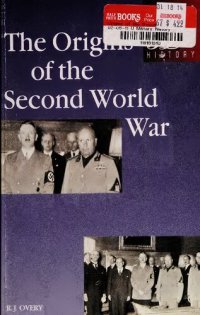
Ebook: The origins of the Second World War
Author: R. J. Overy Richard Overy
- Genre: History // Military History
- Tags: World War II, Great Britain, Foreign relations, Nazi Germany, France
- Series: Seminar studies in history
- Year: 1998
- Publisher: Longman
- City: London
- Edition: 1
- Language: English
- pdf
The Second World War was once a simple event to explain. If it did not exactly boil down to one word - Hitler - the war was never¬ theless the Germans’ war. Unlike the war of 1914, that of 1939 had a simple reducible core. Germany provoked war deliberately to overturn the Versailles Settlement of 1919 and win the continental hegemony denied her in 1914. Moreover the Germany of 1939 was led by a party committed to a demonstrably evil cause. Fighting Germany, and later Italy and Japan, was to fight on the side of good in the defence of democracy and freedom, against what President Roosevelt called ‘the forces endeavouring to enslave the entire world’.
For all its simplicity there is much to recommend this view. Without Hitler’s restless quest for empire, war might have been avoided. If the western powers had not been faced with an accumulation of crisis after crisis in central Europe, which built up almost irresistible pressure for conflict by 1939, German aims might have been accommodated in the international system without war. This is, of course, a very large ‘if. In practice the outbreak of war was a great deal more complicated than this. Historians cannot even agree on the nature of the pressures that pushed Hitler towards war. While some see a clear intention on his part to launch wars of aggression, based on the ideas of racial struggle and world empire expressed in Hitler’s writing and speeches, others emphasise the importance of functional explanations: that the Nazi leaders were forced into war in 1939 through fear of domestic unrest and economic crisis brought about by the excessive cost of rearmament. Nor can agreement be reached on the kind of war Hitler launched: total war which required the full use of the nation’s resources to fight the great powers for world status; or Blitzkrieg, short opportunistic wars, designed to avert domestic political pressure by using a minimum of military resources for each short campaign.
For all its simplicity there is much to recommend this view. Without Hitler’s restless quest for empire, war might have been avoided. If the western powers had not been faced with an accumulation of crisis after crisis in central Europe, which built up almost irresistible pressure for conflict by 1939, German aims might have been accommodated in the international system without war. This is, of course, a very large ‘if. In practice the outbreak of war was a great deal more complicated than this. Historians cannot even agree on the nature of the pressures that pushed Hitler towards war. While some see a clear intention on his part to launch wars of aggression, based on the ideas of racial struggle and world empire expressed in Hitler’s writing and speeches, others emphasise the importance of functional explanations: that the Nazi leaders were forced into war in 1939 through fear of domestic unrest and economic crisis brought about by the excessive cost of rearmament. Nor can agreement be reached on the kind of war Hitler launched: total war which required the full use of the nation’s resources to fight the great powers for world status; or Blitzkrieg, short opportunistic wars, designed to avert domestic political pressure by using a minimum of military resources for each short campaign.
Download the book The origins of the Second World War for free or read online
Continue reading on any device:

Last viewed books
Related books
{related-news}
Comments (0)